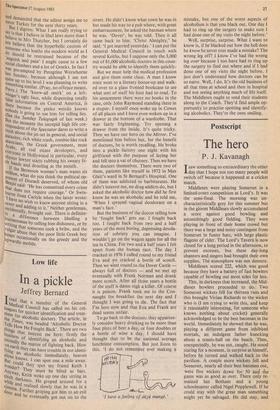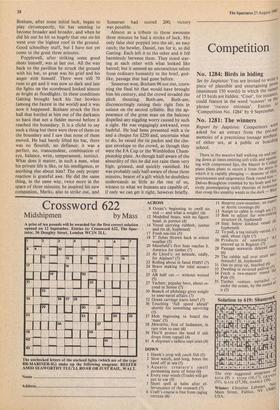Postscript
The hero
P. J. Kavanagh
Isaw something so extraordinary the other day that 1 hope not too many people will switch off because it happened at a cricket match.
Middlesex were playing Somerset in a limited-overs competition at Lord's. It was the semi-final. The morning was un- characteristically grey for this summer but in the gloom Middlesex slowly accumulated a score against good bowling and astonishingly good fielding. They were playing in front of their home crowd but there was a large and noisy contingent from Somerset in funny hats, with large plastic flagons of cider. The Lord's Tavern is now closed for a long period in the afternoon, to prevent excesses, but these day-long chanters and singers had brought their own supplies. The atmosphere was not demure.
Middlesex scored 222, which was good because they have a battery of fast bowlers capable of bowling out most sides for less.
This, in darkness that increased, the Mid- dlesex bowlers proceeded to do. Two Somerset wickets fell for thirteen runs and this brought Vivian Richards to the wicket who is (I am trying to write this, and keep it reasonably interesting, for someone who knows nothing about cricket) generally acknowledged to be the best batsman in the world. Immediately he showed that he was, playing a different game from inhibited mortals, an indulgent father knocking about a tennis-ball on the beach. Then, unexpectedly, he was out, caught. He stood staring for a moment, in surprise at himself, before he turned and walked back to the pavilion. A couple more wickets fell and Somerset, nearly all their best batsmen out, were five wickets down for 50 and the game was as good as over. There only re- mained Ian Botham and a young schoolmaster called Nigel Popplewell. If he could stay with the great man something might yet be salvaged. He did stay, and
Botham, after some initial luck, began to play circumspectly, his bat seeming to become broader and broader, and when he did hit out he hit so hugely that one six-hit went over the highest roof in the ground. Good schoolboy stuff, but I have not yet come to the great three minutes.
Popplewell, after striking some good shots himself, was at last out. All the way back to the pavilion he struck the ground with his bat, so great was his grief and his anger with himself. There were still 70 runs to get and it was now so dark and late the lights on the scoreboard looked almost as bright as floodlights. In these conditions Gatting brought back his fast bowlers (among the fastest in the world) and it was now it happened. Botham struck the first ball that hurtled at him out of the darkness so hard that not a fielder moved before it reached the boundary. It is a cliche to say such a thing but there were three of them on the boundary and I saw that none of them moved. He had barely lifted his bat, there was no flourish, no defiance; it was a perfect, no, transcendent, combination of eye, balance, wrist, temperament, instinct. What does it matter, in such a man, what his private life is like, or his intelligence, or anything else about him? The only proper reaction is grateful awe. He did the same thing, in the same way, twice more in the space of three minutes; he inspired his new companion, Marks, also to strike out, and Somerset had scored 200; victory was possible.
Almost as a tribute to those awesome three minutes he had a stroke of luck. His only false shot popped into the air, an easy catch; the bowler, Daniel, ran for it, so did Gatting. Each left it to the other and it fell harmlessly between them. They stood star- ing at each other with what looked like hatred; but it seemed an unconscious salute from ordinary humanity to the brief, god- like, passage that had gone before.
Somerset won, Botham 96 not out, scorn- ning the final hit that would have brought him his century, and the crowd invaded the pitch shouting Both-am, Both-am, disconcertingly raising their right fists in unison on the second syllable. But the ap- pearance of the great man on the balcony dispelled any niggling worry caused by such a sight. He was engagingly awkward, even bashful. He had been presented with a tie and a cheque for £250 and, uncertain what to do, he raised the tie packet and the che- que envelope to the crowd, as though they were the FA Cup or the Wimbledon Cham- pionship plate. As though half-aware of the absurdity of this he did not raise them very high, grinned, and quickly vanished. He was probably only half-aware of those three minutes, bearer of a gift which he doubtless understands as little as the rest of us, witness to what we humans are capable of, if only we can get it right, however briefly.



































 Previous page
Previous page